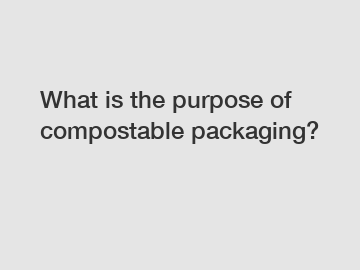What is the purpose of compostable packaging?
What is the purpose of compostable packaging?
Compostable packaging serves the purpose of offering a sustainable alternative to traditional packaging materials. The primary goal of compostable packaging is to reduce the environmental impact caused by conventional packaging, which often ends up in landfills or as litter. By utilizing compostable materials, we can minimize waste and contribute to a more circular economy.
Compostable packaging is made from organic materials, such as plant-based polymers or bioplastics derived from renewable sources. Unlike non-compostable materials like plastic or Styrofoam, compostable packaging can break down into natural elements when properly composted. This decomposition process allows the packaging to return valuable nutrients to the soil, serving as a fertilizer for plants and contributing to the growth of new life.

The idea of compostable packaging arose as a response to the growing concern about the long-term consequences of traditional packaging materials. Non-biodegradable materials, such as plastic, take hundreds of years to decompose, leading to severe pollution and harming wildlife. With landfills becoming overcrowded and oceans turning into plastic-filled landscapes, finding an eco-friendly solution has become imperative.
To validate the premise of compostable packaging, extensive research and testing have been conducted. Various studies have shown that compostable materials can successfully biodegrade within a composting environment, resulting in minimal environmental impact. These materials not only break down faster but do so without releasing harmful toxins into the environment. Additionally, compostable packaging has been proven to reduce greenhouse gas emissions compared to traditional packaging materials during both production and disposal.
The significance of compostable packaging lies primarily in its ability to contribute to a more sustainable future. By adopting compostable packaging in our everyday lives, we can significantly reduce the amount of waste ending up in landfills. Moreover, compostable packaging assists in the production of high-quality compost, benefiting agricultural practices and promoting healthier soil. This sustainable packaging solution aligns with the principles of a circular economy, where resources are utilized and replenished, minimizing waste and reducing the detrimental impact on our planet.
The impact of compostable packaging reaches beyond its environmental advantages. It also has societal implications by improving consumer awareness. As people become more conscious of the need to reduce waste and protect the environment, the demand for compostable packaging increases. This shift in consumer behavior encourages businesses to invest in sustainable practices and support the development of more eco-friendly packaging solutions. Ultimately, this leads to a greater focus on responsible consumption and production practices.
In conclusion, the purpose of compostable packaging is to provide an environmentally friendly alternative to traditional packaging materials. Through its ability to decompose into natural elements, contribute to soil fertility, reduce waste, and minimize environmental impacts, compostable packaging offers a sustainable solution to the packaging industry. By embracing compostable packaging, we can create a more sustainable future for generations to come.
If you want to learn more, please visit our website retort pouches, compostable flexible packaging, health & beauty pouches.


